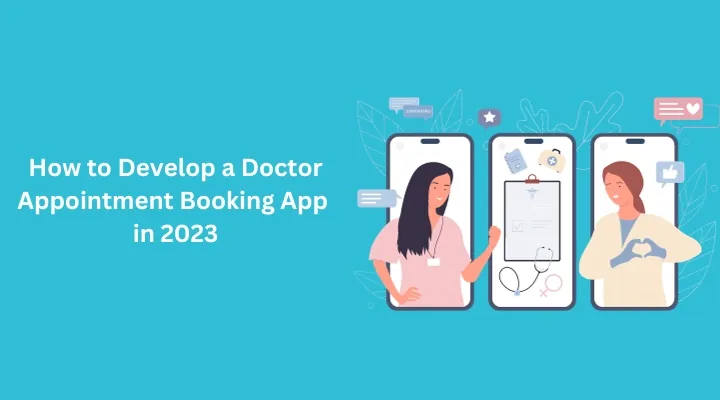How to Develop a Doctor Appointment Booking App in 2023

In today's fast-paced world, where time is of the essence, the healthcare industry is no exception to the need for convenience and efficiency. As we navigate through the ever-evolving landscape of healthcare, one thing remains constant - the importance of timely access to medical services. This is where demand for doctor appointment booking apps is on the rise, driven by factors like the aging population, increased healthcare awareness, and the COVID-19 pandemic. The market is competitive, with several established players like Zocdoc, Doctolib, and Practo. In this guide, we will walk you through the process of developing a doctor appointment booking app in 2023.
Key Features of a Doctor Appointment Booking App
When it comes to crafting a top-notch Doctor Appointment Booking App, It is important to have a separate app for both stakeholder so that each stakeholder can be managed separately easily. Certain key features play a pivotal role in ensuring a seamless experience for each of the two main Stakeholders, Doctors and consumers.
A. For Doctor
Create a dedicated app front for them, where they can log in, manage their listings, update their availability, and efficiently handle appointments. Empowering healthcare providers ensures a seamless experience for users.
B. For Consumers
Search: Users love convenience. Integrate a robust search feature that allows them to find doctors by name, specialty, disease, or health concern. It's about simplifying their journey to wellness.
Easy Doctor Discovery: Make it a breeze for users to discover doctors based on categories, specialties, or even the organs they specialize in. This feature opens doors to tailored healthcare solutions.
Appointment Scheduling: Implement an easy-to-use booking system that allows users to select a suitable time slot and make appointments with their chosen doctors. Ensure that users can see real-time availability of doctors, reducing the chances of double booking.
Payment Integration: Integrate a secure payment gateway to facilitate transactions for appointment bookings.
Telemedicine Integration: Consider adding telemedicine features - whether you prefer the convenience of video calls, the simplicity of phone consultations, the comfort of home visits, or the assurance of clinic or hospital appointments, your app should offer flexible choices.
In-App Customer Support: Health-related matters can sometimes be confusing or concerning. Offer in-app customer support to address queries, provide guidance, and instill trust.
Post-Order Details: Once an appointment is booked, the user journey doesn't end there. Integrate maps for hassle-free navigation to the doctor's location. Provide invoices for transparency, access to customer support for immediate assistance, and the flexibility to cancel or reschedule appointments when life gets in the way.
Push Notifications: Send timely reminders for appointments, medication, and health check-ups.
Medical Records Access:Allow users to access their medical history, test results, and prescriptions within the app.
Development Technologies to use
The choice of technology stack can significantly impact your app's performance and scalability. Here are some technologies you should consider:
Programming Languages: Swift (for iOS) and Kotlin (for Android) are popular choices. For cross-platform development, you can opt for Flutter or React Native.
Backend Development: Choose a reliable backend framework like Node.js, Ruby on Rails, or Django for building the server-side logic.
Database: Use databases like PostgreSQL or MongoDB to store user data securely.
Cloud Services: Consider cloud providers like AWS or Google Cloud for hosting and scaling your app.
Security and Compliance for Doctor Appointment Apps
When dealing with sensitive healthcare data, security is paramount. Implement encryption protocols, regularly update security patches, and comply with data protection regulations like HIPAA or GDPR.
Launching and Marketing Your App
Once your app is ready, launch it on app stores (Google Play Store and Apple App Store). Invest in marketing strategies to reach your target audience, such as social media campaigns, search engine optimization (SEO), and partnerships with healthcare providers.
FAQs
1. Is it necessary to comply with healthcare regulations?
Yes, compliance with healthcare regulations is mandatory to protect user data and ensure the safety of healthcare services.
2. How can I make my app stand out in a competitive market?
Offer unique features like telemedicine, integration with wearable devices, or a loyalty program for users.
3. What are the ongoing maintenance costs for such an app?
Maintenance costs include server hosting, updates, and customer support. They can range from 20% to 50% of the initial development cost annually.
4. Can I expand my app internationally?
Yes, you can expand globally, but be prepared to adapt to different healthcare regulations and user preferences in each region.